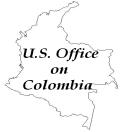Memo
from four U.S. Non-Governmental Organizations, July 21, 2003
Vote
Yes on Amendment to Cut Colombian Military Aid & Transfer Funds
to Global HIV/AIDS
Reps. McGovern
and Skelton will offer an amendment to the foreign operations appropriations
bill that will transfer $75 million in Colombian military aid to global
programs for HIV/AIDS prevention and treatment. The amendment cuts
only a small portion of military aid to Colombia, leaving in place
over $350 million in aid to Colombia's police and military in the foreign
aid bill, in addition to more than $100 million in the defense bill,
not to mention the $105 million Colombia just received in the Iraq 03
supplemental. However, it will send a message that Congress
requires a more defined US game plan and exit strategy in Colombia;
believes respect for human rights is essential; and is committed to
addressing the AIDS pandemic. Vote YES on this amendment for
the following reasons.
1.
Counternarcotics programs to the Andean region are notoriously ineffective—and
Plan Colombia is no different.
- Coca
production in the Andes has increased since Plan Colombia
was enacted. Coca production in Peru, Bolivia, and Colombia rose
to 205,400 hectares in 2002 from 184,900 hectares in 2000 (State Department’s
International Narcotics Control Strategy Reports for 2000 and 2002).
(A drop in coca production in Colombia in 2002 did not bring Colombia’s
coca level down to what it was in 2000, and was partially offset by
increases in Peru & Bolivia.)
- Eradication
efforts in Colombia are shifting coca production back to Peru and
Bolivia. After a decade of declines in cultivation in Bolivia
and Peru, coca cultivation rose in Bolivia (from 14,600 hectares in
2000 to 24,400 in 2002), and rose slightly in Peru (from 34,100 hectares
in 2000 to 36,000 hectares in 2002).
- Coca
production in the Andes has remained virtually stable since 1988
despite over $5.6 billion dollars in eradication and interdiction
efforts spent by the US (see bar graph).
2.
The Colombian army has resolutely refused to cut enduring ties between
the army and the paramilitary forces involved in gross human rights
violations.
- Officers
credibly alleged to have committed abuses continue to remain on active
duty and in command of troops (Human Rights Watch, Human Rights
Certification under public law 108-7, July 8, 2003). Only a handful
of lower level officers, few above the level of sergeant, have been
suspended (listed in the State Department’s July 8th,
2003 memorandum to the Congress).
- “In
case after case, the armed forces ignore credible evidence gathered
against officers, taking advantage of the country’s slow, partial
and often impotent judicial system to evade accountability ….
Attorney General Luis Camilo Osorio has slowed down or blocked investigation
into military support for and tolerance of paramilitary activity.
In many regions, prosecutors are simply too afraid to aggressively
investigate, fearing both the military and lack of support for their
investigations from the Attorney General.” (Human Rights
Watch, Human Rights Certification under public law 108-7, July 8,
2003).
- “Impunity
for military personnel who collaborated with members of paramilitary
groups remained common.” (State Department, Country Reports on
Human Rights Practices for 2002, March 2003)
- Army
collaboration with paramilitaries raises questions about its commitment
to the war on drugs--- paramilitaries now control some 40% of the
drug trade in Colombia (Washington Post, "Colombian Fighters’
Drug Trade is Detailed,” June 26, 2003).
- Direct
violations by the Colombian military increased in 2002 (United Nations
High Commissioner for Human Rights 2003 annual report).
- The
State Department has failed to use the leverage Congress granted in
the form of human rights conditions, repeatedly certifying Colombia
has met the conditions despite failure to suspend, investigate and
prosecute military officers involved in collaboration with paramilitaries.
The latest round of certification was termed “shameful”
by Amnesty International and “a perverse signal” by Human
Rights Watch.
3.
There is no clear end in sight, no exit strategy, to ever-deeper
US involvement in Colombia.
- “Nearly
3 years [after Plan Colombia started], the Departments of State and
Defense have still not developed estimates of future program costs,
defined their future roles in Colombia, identified a proposed end
state, or determined how they plan to achieve it.” “Neither
the Colombian Army nor the Colombian National Police can sustain ongoing
counternarcotics programs without continued US funding and contractor
support for the foreseeable future.” (GAO, Financial and
Management Challenges Continue to Complicate Efforts to Reduce Illicit
Drug Activities in Colombia, June 3, 2003.)
- “The
United States cannot fill in for wealthy Colombians who neither pay
the cost of their own war nor serve in their own military," according
to the Center for International Policy's Adam Isacson. “Though
supposedly fighting for its very survival, Colombia's government spends
less on defense, as a percentage of GDP, than the US does (4.5 % vs.
4 percent - and the Colombian figure includes all police spending).
The Uribe government did charge a "war tax" that added 1%
of GDP. But this was a one-time levy, and there are no plans to sustain
it. Colombian law continues to exempt those few recruits with
high-school educations from combat. Though legislation to broaden
recruitment is regularly introduced in Colombia's Congress, it never
seems to get anywhere. Moreover, the Colombian government has
failed to fund adequately economic development programs that are an
essential component of addressing the roots of conflict.”
4.
Additional funding for global HIV/AIDS programs is imperative.
- The
House foreign aid bill contains only $1.43 billion, less than the
$3 billion per year anticipated when President Bush pledged $15 billion
over five years in the State of the Union address.
- President
Bush expressed the urgency in his trip to Africa and made promises
that should be kept. "This is the deadliest enemy Africa has
ever faced, and you will not face this enemy alone.” “The
first thing I wanted the leadership in Africa to know is the American
people care deeply about the pandemic that sweeps across this continent,
the pandemic of HIV-AIDS," Bush said. "We're not only a
powerful nation, we're also a compassionate nation." --Dana
Milbank, “Bush Pledges Help on Deadliest Foe,” Washington
Post, July 11, 2003.
|




